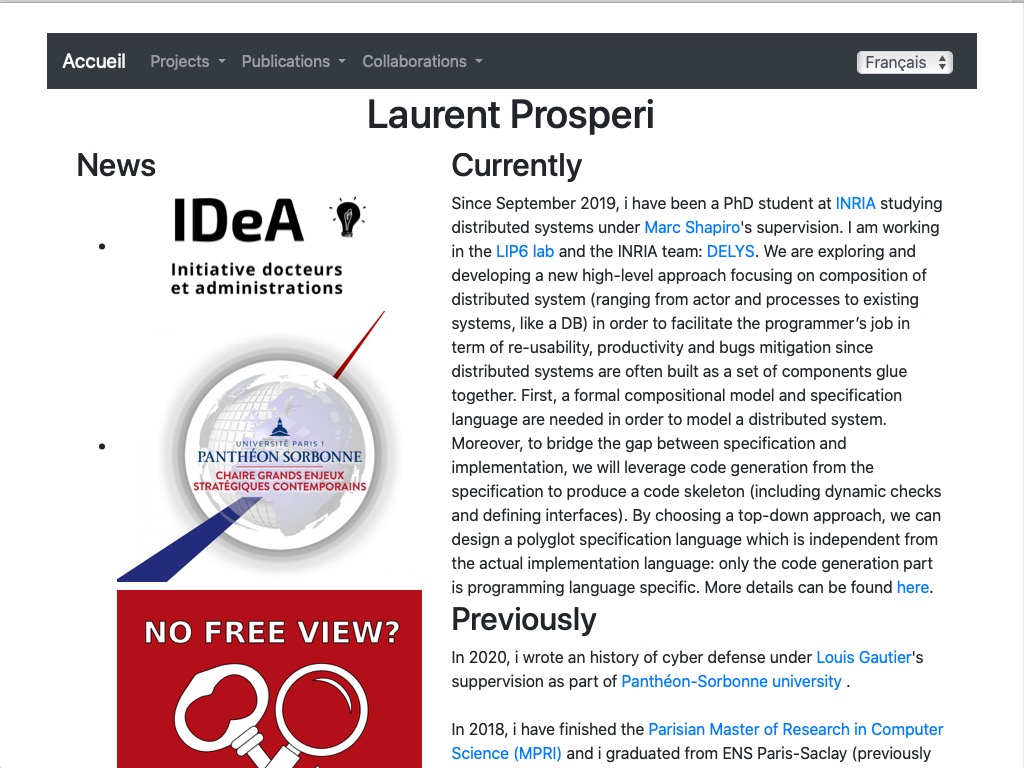PROSPERI Laurent
Doktorant at Sorbonne UniversityForschungsgruppe : DELYS
https://laurentprosperi.info
Forschungsleitung (Direction de recherche) : Mesaac MAKPANGOU
Co-Betreuung : SHAPIRO Marc
Varda: a language for programming distributed systems by composition
Large distributed systems are often built by assembling off-the-shelf (OTS) components developed independently. The current approach is to interconnect their APIs manually. This is ad-hoc, complex, tedious, and error-prone.
To address this issue, Varda offers a higher-level language, motivated by a vision of safe-by design. To express a system, a programmer describes its architecture, involving OTS components, using well-defined entities and constraints. To provide safety, the compiler performs static verification, generates a correct-by-construction implementation and inject dynamic checks. To enhance programmers’ productivity, Varda offloads the boilerplate plumbing to the compiler. To improve performance, the compiler applies property-preserving optimisations (e.g., component inlining).
Our experiments show that Varda applications are compact, exhibit modular and reusable design, and have a modest run-time overhead.
Verteidigung einer Doktorarbeit : 05.09.2023
Mitglieder der Prüfungskommission :
François POTTIER, Directeur de Recherche, InriaFrançois TAIANI, Professeur des universités, IRISA, Université de Rennes
Cezara DR?GOI, Applied Scientist, Amazon Web Service
Adrien GUATTO, Maître de conférences, IRIF, Université Paris Cité
Mira MEZINI, Professeure des universités, Technical University of Darmstadt
Ahmed BOUAJJANI, Professeur des universités, IRIF, Université Paris Cité
Mesaac MAKPANGOU, Chargé de recherche, Sorbonne Université, LIP6, Inria
Marc SHAPIRO, Directeur de recherche (émérite), Sorbonne Université, LIP6, Inria
Datum, an dem das LIP6 verlassen wurde : 30.09.2023
Publikationen 2020-2023
-
2023
- L. Prosperi : “Varda: a language for programming distributed systems by composition”, these, verteidigung einer doktorarbeit 05.09.2023, forschungsleitung (direction de recherche) Makpangou, Mesaac, co-betreuung : Shapiro, Marc (2023)
- B. Martin, L. Prosperi, M. Shapiro : “Transactional-Turn Causal Consistency”, Lecture Notes in Computer Science (LNCS), Limassol, Cyprus, (Springer) (2023)
-
2022
- L. Prosperi, Ah. Bouajjani, M. Shapiro : “Varda: A Framework for Compositional Distributed Programming”, NETYS 2022: The 10th International Conference on Networked Systems, vol. 13464, Lecture Notes in Computer Science, Marrakech, Morocco, pp. 16-30, (Springer International Publishing), (ISBN: 978-3-031-17436-0) (2022)
-
2020
- B. Martin, L. Prosperi, M. Shapiro : “An environment for composable distributed computing”, EuroDW 2020 - 14th EuroSys Doctoral Workshop, Heraklion / Virtual, Greece (2020)
